The views expressed in our content reflect individual perspectives and do not represent the authoritative views of the Baha'i Faith.
Have you ever seen anything online that struck you as untrue? Unfortunately, we all have. The web and its social media platforms seem riddled with false claims.
So how do we navigate the virtual world, knowing that some parts of it have little resemblance to the truth? How do we tell what’s true and what’s false?
So far in this series, we’ve had the opportunity to reflect on a few spiritual attributes that can help us interact productively with technology. We’ve explored the role of technology in society today, the use of language and words, and most recently, the importance of using technology in a way that lends coherence to our spiritual nature and beliefs. In this essay we’ll reflect on the importance of honesty and truth when it comes to what we see, what we internalize and how we express our views online.
Baha’u’llah, the prophet and founder of the Baha’i Faith, wrote about the capacity that journalism has to become “a mirror of the world,” and to accurately and justly reflect the diversity of life on our planet. However, Baha’u’llah stressed that journalism must be carried out with the utmost justice, equity and truth:
In this Day the secrets of the earth are laid bare before the eyes of men. The pages of swiftly-appearing newspapers are indeed the mirror of the world. They reflect the deeds and the pursuits of divers peoples and kindreds. They both reflect them and make them known. They are a mirror endowed with hearing, sight and speech. This is an amazing and potent phenomenon. However, it behoveth the writers thereof to be purged from the promptings of evil passions and desires and to be attired with the raiment of justice and equity. They should enquire into situations as much as possible and ascertain the facts, then set them down in writing.
… Fair speech and truthfulness, by reason of their lofty rank and position, are regarded as a sun shining above the horizon of knowledge. – Baha’u’llah, Tablets of Baha’u’llah, p. 39.
The Baha’i teachings urge us all to act as advocates for justice and promote voices that speak the truth, regardless of their name or rank. On the receiving end, as consumers of news stories, we also need to read the news with a searching, truth-seeking eye – before sharing articles online:
The essence of all that We have revealed for thee is Justice, is for man to free himself from idle fancy and imitation, discern with the eye of oneness His glorious handiwork, and look into all things with a searching eye. – Ibid., p. 156
How many of us have read a headline, and immediately shared the article, meme or blog on Facebook or Twitter or Instagram before actually reading it? By critically reading a news story first and checking its claims, while searching for truth with a discerning eye, we instantly become more vigilant promoters of journalism “attired with the raiment of justice and equity.”
When it comes to speaking our own truth online, which may sometimes differ from others who we virtually connect with, Abdu’l-Baha offered the following counsel:
… when you meet those whose opinions differ from your own, do not turn away your face from them. All are seeking truth, and there are many roads leading thereto. Truth has many aspects, but it remains always and forever one. Do not allow difference of opinion, or diversity of thought to separate you from your fellow- men, or to be the cause of dispute, hatred and strife in your hearts. Rather, search diligently for the truth and make all men your friends. – Abdu’l-Baha, Paris Talks, p. 52.
Baha’u’llah informed and illustrated the tone and voice we should use when sharing our own experiences or viewpoints online. This passage from his writings highlights the power the expression of our words can have on the hearts and souls of ourselves and others:
He must never seek to exalt himself above any one, must wash away from the tablet of his heart every trace of pride and vainglory, must cling unto patience and resignation, observe silence, and refrain from idle talk. For the tongue is a smouldering fire, and excess of speech a deadly poison. Material fire consumeth the body, whereas the fire of the tongue devoureth both heart and soul. The force of the former lasteth but for a time, whilst the effects of the latter endure a century. – Baha’u’llah, The Book of Certitude, p. 192.
The final essay in this series will explore the attributes of the Baha’i practice of consultation, and why building healthy habits and true friendship contribute a vital ingredient toward having a constructive presence online.




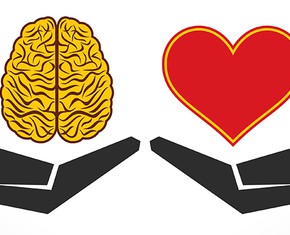


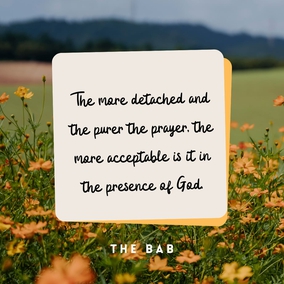
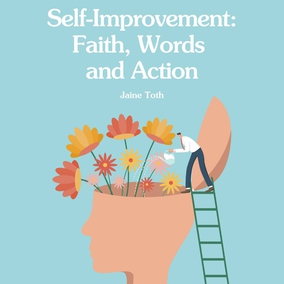

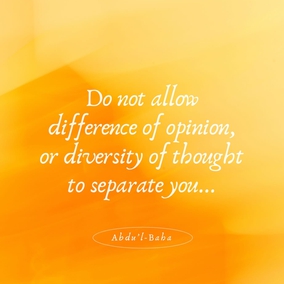
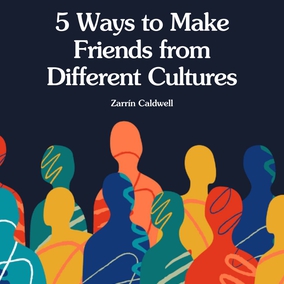
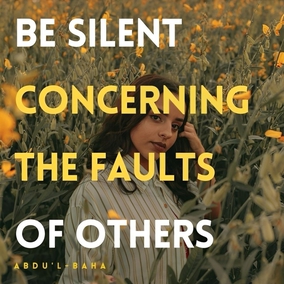



Comments
Sign in or create an account
Continue with Googleor